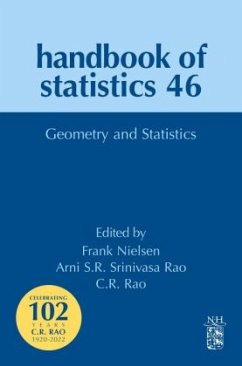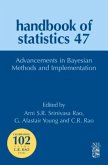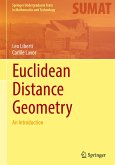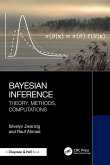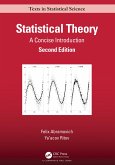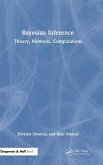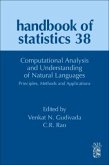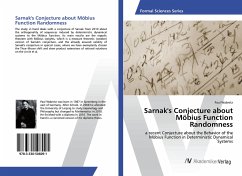Geometry and Statistics
Herausgegeben:Nielsen, Frank; Srinivasa Rao, Arni S.R.; Rao, C. R.
Geometry and Statistics
Herausgegeben:Nielsen, Frank; Srinivasa Rao, Arni S.R.; Rao, C. R.
- Gebundenes Buch
- Merkliste
- Auf die Merkliste
- Bewerten Bewerten
- Teilen
- Produkt teilen
- Produkterinnerung
- Produkterinnerung
Geometry and Statistics, Volume 46 in the Handbook of Statistics series, highlights new advances in the field, with this new volume presenting interesting chapters written by an international board of authors.
Andere Kunden interessierten sich auch für
![Advancements in Bayesian Methods and Implementations Advancements in Bayesian Methods and Implementations]() Advancements in Bayesian Methods and Implementations172,99 €
Advancements in Bayesian Methods and Implementations172,99 €![Euclidean Distance Geometry Euclidean Distance Geometry]() Leo LibertiEuclidean Distance Geometry43,99 €
Leo LibertiEuclidean Distance Geometry43,99 €![Bayesian Inference Bayesian Inference]() Silvelyn ZwanzigBayesian Inference60,99 €
Silvelyn ZwanzigBayesian Inference60,99 €![Statistical Theory Statistical Theory]() Felix AbramovichStatistical Theory76,99 €
Felix AbramovichStatistical Theory76,99 €![Bayesian Inference Bayesian Inference]() Silvelyn ZwanzigBayesian Inference153,99 €
Silvelyn ZwanzigBayesian Inference153,99 €![Computational Analysis and Understanding of Natural Languages: Principles, Methods and Applications Computational Analysis and Understanding of Natural Languages: Principles, Methods and Applications]() Computational Analysis and Understanding of Natural Languages: Principles, Methods and Applications172,99 €
Computational Analysis and Understanding of Natural Languages: Principles, Methods and Applications172,99 €![Sarnak's Conjecture about Möbius Function Randomness Sarnak's Conjecture about Möbius Function Randomness]() Paul WabnitzSarnak's Conjecture about Möbius Function Randomness33,99 €
Paul WabnitzSarnak's Conjecture about Möbius Function Randomness33,99 €-
-
-
Geometry and Statistics, Volume 46 in the Handbook of Statistics series, highlights new advances in the field, with this new volume presenting interesting chapters written by an international board of authors.
Produktdetails
- Produktdetails
- Handbook of Statistics Volume 46
- Verlag: Academic Press / Elsevier Science & Technology
- Artikelnr. des Verlages: S0169-7161(22)X0002-3
- Englisch
- Abmessung: 26mm x 152mm x 229mm
- Gewicht: 900g
- ISBN-13: 9780323913454
- Artikelnr.: 67578294
- Herstellerkennzeichnung Die Herstellerinformationen sind derzeit nicht verfügbar.
- Handbook of Statistics Volume 46
- Verlag: Academic Press / Elsevier Science & Technology
- Artikelnr. des Verlages: S0169-7161(22)X0002-3
- Englisch
- Abmessung: 26mm x 152mm x 229mm
- Gewicht: 900g
- ISBN-13: 9780323913454
- Artikelnr.: 67578294
- Herstellerkennzeichnung Die Herstellerinformationen sind derzeit nicht verfügbar.
Frank Nielsen was awarded his PhD on adaptive computational geometry (1996) from INRIA/University of Cote d'Azur (France).
He is a fellow of Sony Computer Science Laboratories Inc. (Sony CSL, Tokyo) where he currently conducts research on the fundamentals and practice of geometric machine learning and intelligence.
He taught at Ecole Polytechnique (France) visual computing (Charles River Media, 2005) and high-performance computing for data science (Springer, 2016), and currently serves the following peer-reviewed journals: Springer Information Geometry, MDPI Entropy, and IEEE Transactions on Information Theory.
Frank Nielsen co-organizes with Frederic Barbaresco the biannual conference Geometric Science of Information (GSI) since 2013.
Arni S.R. Srinivasa Rao works in pure mathematics, applied mathematics, probability, and artificial intelligence and applications in medicine. He is a Professor at the Medical College of Georgia, Augusta University, U.S.A, and the Director of the Laboratory for Theory and Mathematical Modeling housed within the Division of Infectious Diseases, Medical College of Georgia, Augusta, U.S.A. Previously, Dr. Rao conducted research and/or taught at Mathematical Institute, University of Oxford (2003, 2005-07), Indian Statistical Institute (1998-2002, 2006-2012), Indian Institute of Science (2002-04), University of Guelph (2004-06). Until 2012, Dr. Rao held a permanent faculty position at the Indian Statistical Institute. He has won the Heiwa-Nakajima Award (Japan) and Fast Track Young Scientists Fellowship in Mathematical Sciences (DST, New Delhi). Dr. Rao also proved a major theorem in stationary population models, such as, Rao's Partition Theorem in Populations, Rao-Carey Theorem in stationary populations, and developed mathematical modeling-based policies for the spread of diseases like HIV, H5N1, COVID-19, etc. He developed a new set of network models for understanding avian pathogen biology on grid graphs (these were called chicken walk models), AI Models for COVID-19 and received wide coverage in the science media. Recently, he developed concepts such as "Exact Deep Learning Machines?, and "Multilevel Contours? within a bundle of Complex Number Planes.
He is a fellow of Sony Computer Science Laboratories Inc. (Sony CSL, Tokyo) where he currently conducts research on the fundamentals and practice of geometric machine learning and intelligence.
He taught at Ecole Polytechnique (France) visual computing (Charles River Media, 2005) and high-performance computing for data science (Springer, 2016), and currently serves the following peer-reviewed journals: Springer Information Geometry, MDPI Entropy, and IEEE Transactions on Information Theory.
Frank Nielsen co-organizes with Frederic Barbaresco the biannual conference Geometric Science of Information (GSI) since 2013.
Arni S.R. Srinivasa Rao works in pure mathematics, applied mathematics, probability, and artificial intelligence and applications in medicine. He is a Professor at the Medical College of Georgia, Augusta University, U.S.A, and the Director of the Laboratory for Theory and Mathematical Modeling housed within the Division of Infectious Diseases, Medical College of Georgia, Augusta, U.S.A. Previously, Dr. Rao conducted research and/or taught at Mathematical Institute, University of Oxford (2003, 2005-07), Indian Statistical Institute (1998-2002, 2006-2012), Indian Institute of Science (2002-04), University of Guelph (2004-06). Until 2012, Dr. Rao held a permanent faculty position at the Indian Statistical Institute. He has won the Heiwa-Nakajima Award (Japan) and Fast Track Young Scientists Fellowship in Mathematical Sciences (DST, New Delhi). Dr. Rao also proved a major theorem in stationary population models, such as, Rao's Partition Theorem in Populations, Rao-Carey Theorem in stationary populations, and developed mathematical modeling-based policies for the spread of diseases like HIV, H5N1, COVID-19, etc. He developed a new set of network models for understanding avian pathogen biology on grid graphs (these were called chicken walk models), AI Models for COVID-19 and received wide coverage in the science media. Recently, he developed concepts such as "Exact Deep Learning Machines?, and "Multilevel Contours? within a bundle of Complex Number Planes.
Contributors in this volume include:
Frederic Barbaresco
Mark Girolami
Wolfgang Stummer
Salem Said
Ke Sun
Xavier Pennec
Donald Martin
Paul Marriott
Steven G. Krantz
Frank Nielsen
Arni S.R. Srinivasa Rao
Frederic Barbaresco
Mark Girolami
Wolfgang Stummer
Salem Said
Ke Sun
Xavier Pennec
Donald Martin
Paul Marriott
Steven G. Krantz
Frank Nielsen
Arni S.R. Srinivasa Rao
Contributors in this volume include:
Frederic Barbaresco
Mark Girolami
Wolfgang Stummer
Salem Said
Ke Sun
Xavier Pennec
Donald Martin
Paul Marriott
Steven G. Krantz
Frank Nielsen
Arni S.R. Srinivasa Rao
Frederic Barbaresco
Mark Girolami
Wolfgang Stummer
Salem Said
Ke Sun
Xavier Pennec
Donald Martin
Paul Marriott
Steven G. Krantz
Frank Nielsen
Arni S.R. Srinivasa Rao

